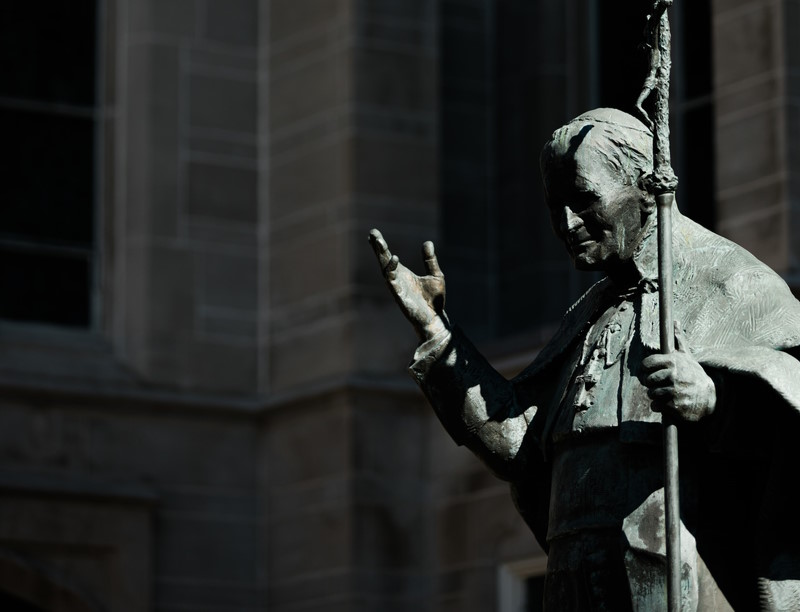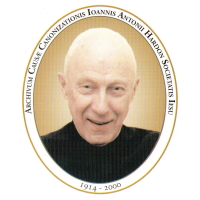How to Be a Loyal Catholic Today? By Being Loyal to the Bishop of Rome
by Fr. John A. Hardon, S.J.
Not too many years ago this would have been a strange title for a lecture, “How to Be a Loyal Catholic Today.” The reason is obvious. Catholics were Catholics. They were not Protestants, or Mormons, or Jehovah’s Witnesses.
But much has happened in the last thirty or so years. Nowadays there are so many people who call themselves Catholic but really are not. There are books published and periodicals; there are conferences given, and symposiums held; there are religious programs and celebrations sponsored, and all professedly Catholic. But so many of these are Catholic only in name and not in reality.
In plain English, a revolution has taken place. The revolution is a revolution in doctrine and morality. But the heart of the revolution is a widespread rejection of the papacy.
What good is it for Pope John Paul II to write in his encyclical The Splendor of Truth that a flood of errors in our day distorts or denies the most fundamental premises of Christianity? Unless Catholics believe that Pope John Paul II is the Vicar of Christ, why should anyone believe him?
The errors prevalent in the modern world undermine every single truth on which sane doctrine and sound morality are based. What are the roots of these erroneous ideas? The first root is to detach human freedom from its essential and necessary relationship to Truth. The second root is the denial that there is any visible authority on earth that is divinely authorized to teach the truth. We Catholics believe that this visible authority is the Bishop of Rome.
We return to our title for this conference, “How to be a Loyal Catholic Today?” The answer is obvious. “By being loyal to the Bishop of Rome.” To be a loyal Catholic we must know the truth taught by the Holy Father, live this truth, and suffer for this truth. The truth, of course, is the teaching of Jesus Christ.
After all, that is what loyalty means. Loyalty means fidelity to the truth. Except that the truth to which we are to be faithful is no mere abstraction. The truth we believe is the living God who became man and appointed Peter and his successors as His spokesmen for the truth.
To know the truth is to believe what the Incarnate God told us about Himself, about ourselves and about our purpose for existence. Christ could not have been more plain.
We are human beings who live here on earth for a short time in order to prepare ourselves for a heavenly eternity. Nothing in this world has any value except as a means of leading us to our heavenly destiny. We are to use our free wills to choose what Christ told us we must do and avoid at any cost what He forbade. On Mt. Sinai, God gave the chosen people the Ten Commandments through Moses the prophet. But when God became man, He personally taught his followers that the Ten Commandments were to be elevated as He explained them. The fifth, sixth, and seventh chapters of Saint Matthew’s Gospel are a compendium of what Jesus called the New Law.
Know the Truth
It is one thing, however, for Christ to have revealed the moral truths of Christianity. It is something else for us to know them. To know this truth we must submit our minds to the divine mind of the Son of God who became the Son of Mary. We must submit our minds to the mind of the Vicar of Christ whom Christ told, after His resurrection, to “feed my lambs …feed my sheep.” Our children are the lambs and we are the sheep whom the Bishop of Rome has been appointed by Jesus Christ to feed us with the truth that God became man to teach us.
In His Sermon on the Mount, Christ told married people they are to be two in one flesh, that Christian marriage cannot be dissolved by any human power.
Over the centuries since the Savior died on the cross, there have been many breaks with the Catholic Church. In the thirteenth century whole nations broke with the Roman Catholic Church, to become what we now call orthodox Christians. In the sixteenth century millions of once professed Catholics again broke with the Holy See. They formed what now amount to over four thousand Protestant denominations throughout the world. From the dawn of Christianity to the present day, there have been hundreds of millions who have separated themselves from the Catholic Church. On examination, we find that every major break with Catholic unity has been over the Papal insistence on the indissolvability of Christian, consummated marriage.
The lowest official figure for the number of abortions of innocent unborn children every year is now over seventy million. Who is the only authority in this world that still defends the right of unborn children to be born? Who alone defends the rights of the aged to remain alive and not be put to death? Who is it? It is the Bishop of Rome. Never before in human history has the need for Papal authority been, I don’t say important, nor do I even say indispensable. Obedience to the teaching of the Bishop of Rome has become the norm of moral sanity.
Every human being is a believer. My favorite definition of man is not that of Aristotle who defined man as a rational animal. I prefer to define man as a believing animal. But what a difference between believing what you like and believing you are to do what you strongly dislike.
All of this is locked up in what is the first condition for being a loyal Catholic. A loyal Catholic submits his mind in accepting everything that Christ teaches through the Bishop of Rome. We must surrender our proud intellects to accept what we do not comprehend. And believe that we have a free will for one purpose: to submit our freedom to the divine will.
And how is Christ teaching us today? He is teaching us through the Bishop of Rome, on whom He promised to build His Church against which the gates of Hell would not prevail.
Live The Truth
There is no substitute for knowing the truth that Christ told us to believe. But knowing this truth by faith is not enough. To be a Catholic it is not enough merely to believe what the Church teaches. We must also put into practice what we believe. To be a loyal Catholic means especially living what we believe.
One pope after another over the centuries has insisted that Catholics understand what they believe. But this understanding must correspond with what the Bishops of Rome tell us is the truth of our faith.
In approving the Catechism of the Catholic Church in 1992, Pope John Paul II declared he was doing so “by virtue of my Apostolic Authority.” He further declared, it “is a statement of the Church’s faith and of Catholic doctrine, attested or illumined by Sacred Scripture, the Apostolic Tradition and the Church’s Magisterium. I declare it to be a sure norm for teaching the faith and thus a valid and legitimate instrument for ecclesial communion. May it serve the renewal to which the Holy Spirit ceaselessly calls the Church of God, the Body of Christ, on her pilgrimage to the undiminished light of the Kingdom!”
Thus, the Bishops of Rome since Peter’s time have insisted not only that we know what is revealed truth but that we understand it. Speaking to you, I would say from the depths of my heart, learn what the latest Catechism of the Catholic Church really teaches. The only absolute assurance you have that you are learning what Christ wants us to learn is by following this Catechism and those explanations of its contents which correspond to the teaching of Pope John Paul II.
Suffer for the Truth
We are now in a position to answer the hardest question on “How to be a loyal Catholic today.” To be a loyal Catholic means to pay dearly for one’s faith in Jesus Christ. It is impossible to exaggerate; shall I use the word “expensive”? It is not just to call oneself a Catholic or be considered a Catholic but to be a loyal Catholic.
As we said in the beginning of this conference, we are now living in a world that is literally trying to destroy each human being as a person. Our faith teaches us that every human being is a person who has a free will, which is to be submitted to the will of God. What is the world teaching in our day? It is telling everyone from infancy that “Your own free will is the only real norm for morality. What you want to do is right, and everyone must respect your rights.”
Those who challenge this new paganism are faced with a difficult option. Either they conform to this philosophy or they are faced with the prospect of martyrdom.
To the best of my knowledge, never in the history of the Church, has any pope spoken and written more clearly about the need for martyrdom than has Pope John Paul II. The reason is obvious. He has no illusions about what it means to be a loyal Catholic on the eve of the third millenium. He quotes from Sacred Scripture to show that Jesus Christ was the primary witness for proclaiming the truth. Christ was followed by Saint Stephen and the apostles and by now twenty centuries of men, women, and children who have laid down their lives rather than deny or compromise Christ’s teaching on mortal sin.
The Holy Father asks how martyrdom is a witness to both God’s holiness and man’s personal dignity. He answers: martyrdom witnesses to God’s holiness by testifying to the grace that God gives the martyr. He also testifies to man’s personal dignity because our highest act of virtue is to suffer martyrdom rather than disobey a divine moral law.
The Vicar of Christ finally asks whether there is such a thing as a living martyrdom. He answers without qualification; yes we are living martyrs when we accept the opposition of this world for the sake of eternal rewards. For the last time, therefore, we ask how are we to be loyal Catholics? We answer: to be a loyal Catholic today we must love the Cross – because we love the God who became man in order to die on His Cross out of love for us. Either we are ready to embrace the Cross out of love for Jesus Christ, or we are Catholic only in name.
Who are the living martyrs today? They are those who hear in the Bishop of Rome the voice of Jesus Christ.
Jesus Christ is on earth in two ways. He is on earth physically present in the Holy Eucharist, the same Jesus who died on Calvary and rose from the dead on Easter Sunday.
But Jesus Christ is also on earth in the Bishop of Rome. He is on earth teaching us through His Vicar what He wants us to believe and follow.
Anyone who thinks that this is either pious rhetoric or mere poetry is living in a dream world. Thank God, you and I know better.

